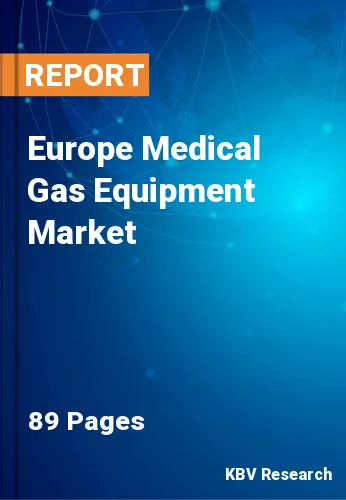The Europe Medical Gas Equipment Market would witness market growth of 7.4% CAGR during the forecast period (2023-2029).
A considerable portion of mortality from non-communicable diseases is due to respiratory infections, which are a serious burden for healthcare systems. The three main causes are pneumonia, asthma, and COPD. By putting less stress on the heart than the lungs and minimizing pulmonary artery hypertension, oxygen therapy can be used for managing some chronic lung diseases like COPD. Numerous respiratory diseases can be treated with medical gases, and the market is expanding due to the rising prevalence of these diseases.
Vacuum systems/pumps, manifolds, flowmeters, alarm systems, and other devices are being used to address the growing demand for dependable, safe, and effective respiratory treatment. Several variables, including an increase in surgeries and hospital admissions as well as an aging population, are fueling the market's expansion. With new technologies like remote monitoring systems, digital flow meters, and wireless connectivity, these devices are becoming more effective, dependable, and safe for patients.
As a result, there is a corresponding rise in the demand for equipment that can accurately and consistently deliver gases to patients. The market is being driven forward by the increasing cost of healthcare and the expanding demand for home healthcare and point-of-care diagnostics. The demand for respiratory support is also increasing due to cigarette usage and rising pollution levels, further driving the market.
Many clinics, hospitals, and other healthcare institutions may be found in Europe, which has a developed healthcare infrastructure. This infrastructure makes the region's substantial use of medical gas equipment possible. In addition, Europe's large and ageing population has fueled an increase in healthcare needs. Medical gas equipment must be used in many healthcare settings, including anesthesia, respiratory therapy, and laboratory analysis—which is crucial for the aging population. Europe's robust regulatory environment has facilitated the development of high-quality medical gas equipment that complies with stringent safety standards. This has enhanced public confidence in the region's market. As a result, the region now has an encouraging business environment and has seen increased investment.
The Germany market dominated the Europe Medical Gas Equipment Market by Country in 2022, and would continue to be a dominant market till 2029; thereby, achieving a market value of $241.7 million by 2029. The UK market is anticipated to grow at a CAGR of 6.5% during (2023 - 2029). Additionally, The France market would exhibit a CAGR of 8.2% during (2023 - 2029).
Based on Product, the market is segmented into Vacuum Systems/Pumps, Manifolds, Alarm Systems, Cylinders & Accessories, Flowmeters, Medical Air Compressors, Hose Assemblies & Valves, Outlets, Regulators and Masks. Based on End Use, the market is segmented into Hospitals, Pharmaceutical & Biotechnology Companies, Diagnostic & Research Laboratories, Academic & Research Institutions, Ambulatory Surgical Centers and Home Healthcare. Based on countries, the market is segmented into Germany, UK, France, Russia, Spain, Italy, and Rest of Europe.
Free Valuable Insights: The Worldwide Medical Gas Equipment Market is Projected to reach USD 3.7 Billion by 2029, at a CAGR of 7.8%
The market research report covers the analysis of key stake holders of the market. Key companies profiled in the report include Air Liquide S.A., Atlas Copco AB, Linde PLC, Allied Healthcare Products, Inc., Enovis Corporation, Powerex, Amico Group of Companies, GCE Holding AB (ESAB Corporation), Genstar Technologies Company Inc. and Rotarex S.A.
By Product
By End-use
By Country
Our team of dedicated experts can provide you with attractive expansion opportunities for your business.

